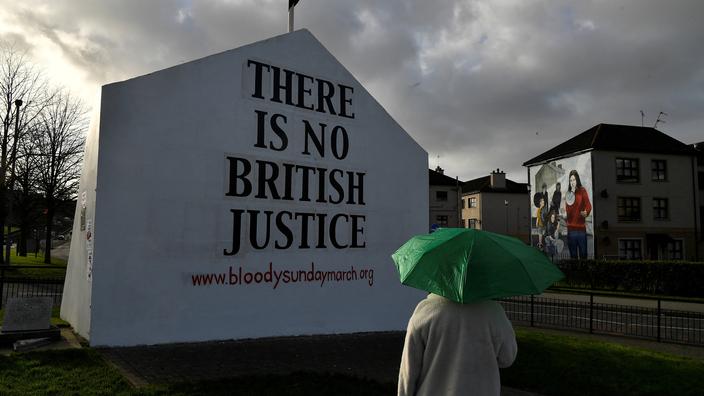Fabrice Mourlon teaches at the Sorbonne.
He is the author of
The Urgency to Say: Northern Ireland After the Conflict
.
Le Figaro. - In what context does Bloody Sunday take place? What happened that day?
Fabrice Mourlon. -
In Northern Ireland, a civil rights movement was formed to fight against discrimination against the Catholic population.
On January 30, 1972, the demonstrators, gathered in Derry in the east of Northern Ireland, wanted to express their disagreement with the law, introduced by the Northern Irish government, which allowed the internment of terrorism suspects without trial. .
The paratroopers who were to secure the demonstration fired and killed fourteen people.
The event took place in an extremely violent climate, since since 1969 riots broke out either in Belfast or in Derry.
1972 is the year when everything changes, the most violent year.
Read alsoThe British army and the ghosts of Northern Ireland
A public inquiry by the British government concluded fairly quickly that the reason people were killed was because they had guns.
Which was obviously wrong.
The investigation was botched.
Since then, the bereaved family members have launched a campaign for justice and truth.
Which happened in 1998.
In the global peace process, initiated by Tony Blair, a new inquiry, the Saville inquiry, was launched and lasted five years.
In 2010, the British Prime Minister spoke in the House of Commons and apologized, acknowledging that the people who had been killed were innocent, and that what had happened was unjustified and unjustifiable.
There were public apologies.
SEE ALSO -
What is Irish "Bloody Sunday"?
The image of priest Edward Daly waving a white handkerchief in front of the British military has gone around the world. Was it harmful for the British?
Of course, it symbolizes the internationalization of the conflict.
Everyone realizes what is happening in Northern Ireland.
It was an event that was extremely publicized and the British government could not pretend that nothing was happening.
Immediately after
Bloody Sunday
, Edward Heath's government suspended parliament in Belfast and the British took direct control of Northern Ireland.
Part of the mural depicting Bloody Sunday: a group of men carrying the body of victim Jackie Duddy in the Bogside area of Londonderry, Northern Ireland.
Paul McErlane/Reuters/X01000
IRA ranks swelled after Bloody Sunday. What was the short-term impact of this event?
The immediate impact is a great feeling of injustice and misunderstanding.
A great feeling of injustice because the court, after three months, exonerates the military, explaining that the fault lies with the demonstrators, suspected of possessing weapons.
Bloody Sunday
bruised
Derry, a city that has always been sidelined in Northern Ireland.
Read alsoBloody Sunday: the long march of truth
What is its political significance?
The
Bloody Sunday
brings into play the policy of aid to victims, put in place from 1998, and the way of re-examining the past.
Two issues still unresolved in Northern Ireland.
There has always been very little consensus on what should be done.
At the time, no one was ready to launch a truth and reconciliation commission.
There were then apologies, but resentment persists.
Bloody Sunday
is
the example of the British invasion in Northern Ireland.
Is there a memory around Bloody Sunday?
Since the 1970s, the Bloody Sunday Trust has campaigned for the truth, but above all for justice, to be done.
A kind of truth was told by the Saville report.
The families of the victims really wanted the soldiers or the British army to be taken to court.
This is what happened in 2016 with the investigation around Private F, but in July 2021 the prosecutor finally decided not to prosecute him.
It's an endless story.
In 2010, after a long legal series, British Prime Minister David Cameron acknowledged the responsibility of the paratroopers and presented the government's apologies. Has this helped to appease the spirits?
The memory is still vivid and reinforces the feeling of belonging to a community that has been flouted.
The official apologies have appeased some spirits, but families of victims wanted to go further.
They wanted a trial.
Read alsoBloody Sunday: the long march of truth
The question of victims in general in Northern Ireland is still not quite settled, especially because there is no mechanism to revisit this past.
Right now in Ireland and Northern Ireland it is the decade of commemorations.
It rekindles tensions, themselves rekindled by Brexit.
The war memorial in honor of the Irish victims.
CLODAGH KILCOYNE / REUTERS
Is a process of reunification between North and South still possible?
It is a process that will be long and should not be forced.
Otherwise, the whole toughest Unionist community will replicate what happened.
The opposition of the DUP (
unionist party which dominated the Northern Irish parliament
) to the Irish protocol is a way of rejecting reunification.
In the Republic of Ireland, the majority of the population supports reunification, even if we have to be careful with the polls.
But the Irish are not prepared to offer Northern Ireland as many grants as the UK.

